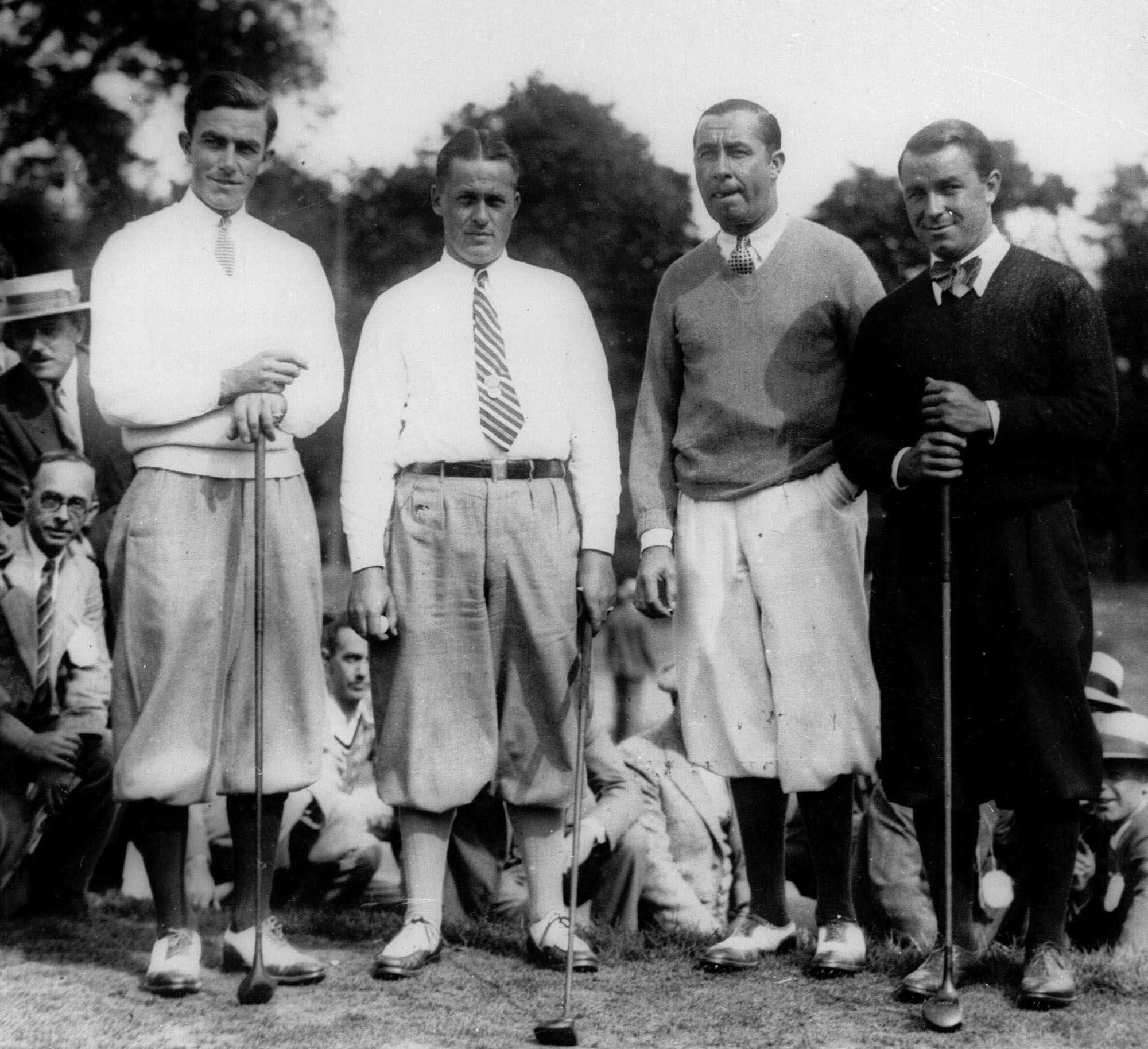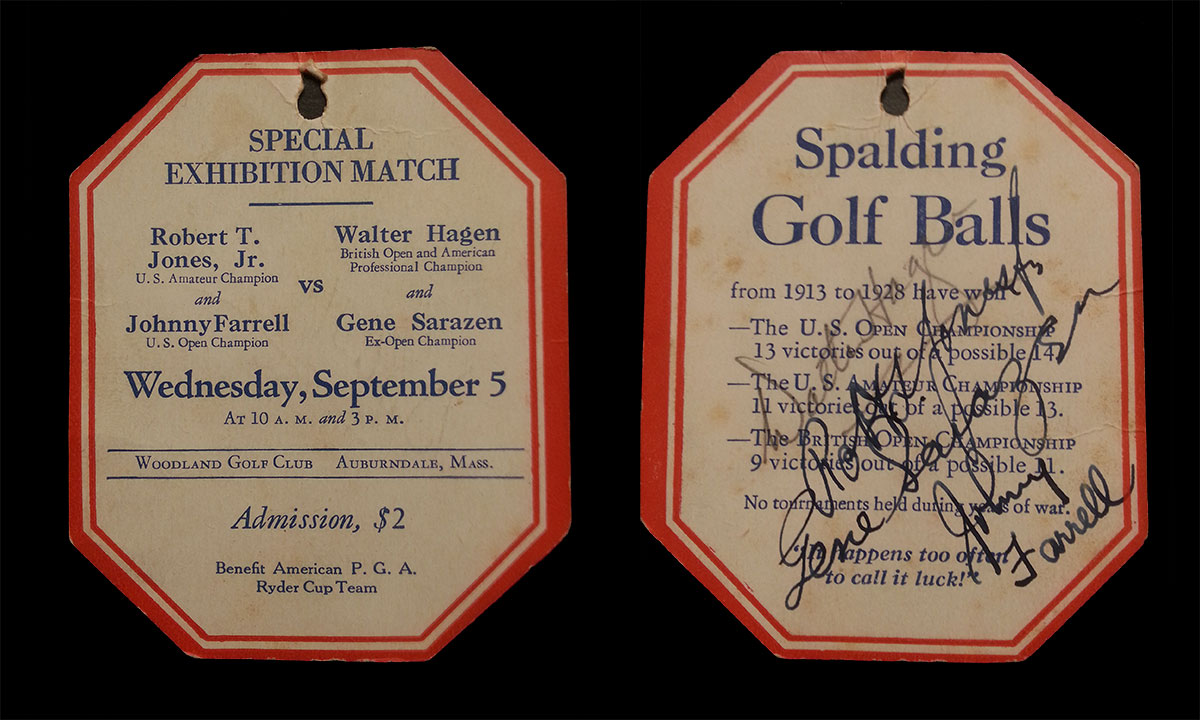In the early 2000s, Mark Kelly was rummaging through a drawer of an old desk which once belonged to his late grandfather, Sturgis Rice. Beneath stacks of papers and personal keepsakes, he found a holy relic no-one in his family, including his mother who had lived in the house with the desk containing the ticket for many decades, had ever seen before. It was a beautiful ticket from a 1928 “special exhibition match” signed by golden era’s the four greatest golfers: Bobby Jones, Walter Hagen, Gene Sarazen, and Johnny Farrell.
In 2015, Kelly sold the house and desk after his mother passed away and put the ticket in a protective sleeve. He now hopes a new owner will share his enjoyment. This one-of-a-kind piece of golf history will be up for sale for the first time in REA’s winter auction, which runs November 18 through December 4.
During an off day on September 6, 1928, at the Woodland Country Club in Auburndale MA, Jones teamed up with Farrell to face Hagen and Sarazen in an exhibition that raised $8,000 to benefit American Ryder Cup players ($139,000 in today’s dollars).
The “New England reticent” capacity crowd “applauded only for real shots,” reported The Brooklyn Eagle, which dispatched a reporter almost five hours away to interview the golfers. After a grueling 36 holes, twice the number a frustrated Jones was expecting for an exhibition, he and Farrell lost by one shot.
Rice, then 30 years old, was an avid golf fan who lived an hour away. When he wasn’t busy raising a family or working for his father’s jewelry business, he was on the links playing. At some point that day, Rice had Hagen sign in pencil and the other three in black fountain pen on the back of the ticket advertising Spalding Golf balls. “I’m guessing that my grandfather approached Hagen first and the golfer took out the pencil he used for scoring,” Kelly says. “Then my grandfather pulled out his fountain pen for the others and Bobby Jones signed last over the rest.”
Jones belonged on top. At the Brae Burn Country Club 17 minutes away and ten days later, he would proceed to win his four of five national amateur championships — back when the amateurs overshadowed the pros— in the widest score since 1895. Considered by most to be the greatest golfer ever, Jones designed the Augusta National Golf Club and was a cofounder of the Masters Tournament. Among his many feats, Jones accomplished what many felt impossible, winning all four majors in the same year, 1930 (the US and British Opens and their respective Amateur Championship events), only to retire immediately afterwards. On top of that, he co-founded the Masters Tournament in 1934.
Hagen was one of the most important figures in the early history of professional golf, helping to both popularize the sport and raise the status of professionals. In 1922 he became the first American-born golfer to win the British Open (which he won three more times during the decade) and his eleven majors victories rank third behind only Jack Nicklaus (18) and Tiger Woods (15). In total, Hagen won two US Opens (1914 and 1919), four British Opens (1922, 1924, 1928-29), five PGA Championships (1921, 1924-27) and five Western Opens. He was also a six-time Ryder Cup captain.
Sarazen dominated his era, too; winning thirty-nine PGA tournaments, including seven majors. He is also one of only five golfers (Hogan, Nicklaus, Player, and Woods are the others) to win each of the four current major championships in his career: British Open (1932), PGA Championship (1922, 1923, 1933), US Open (1922 and 1932), and The Masters (1935). He was inducted into the World Golf Hall of Fame in 1974.
Starting in the spring of 1927, “Handsome” Johnny Farrell won eight straight PGA Tour events, a run that was unequaled until Byron Nelson won 11 in a row in 1945. He won 22 PGA Tour events during his career. Farrell was voted Best Golf Professional in the United States in 1927 and ’28. He is best known for his performance at the 1928 US Open when he tied amateur Bobby Jones, then a two-time champion, after the regulation 72 holes and won the 36-hole playoff by single stroke.
Kelly is parting with his special ticket, but will always own the precious memories of his grandfather who died too soon when he was 16 in 1970. “We had so much golf conversation,” he recalls. “We were such great sidekicks.”



